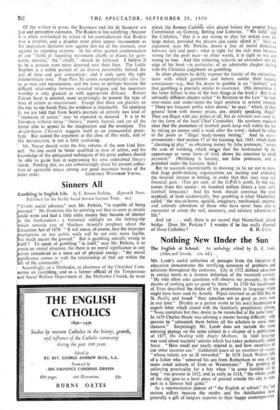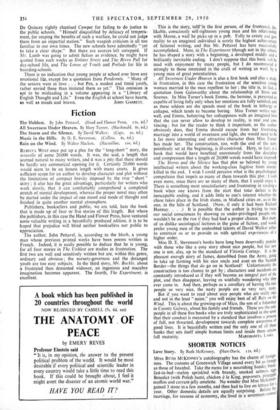Nothing New Under the Sun
MR. LAMB'S useful collection of passages from the literature of education demonstrates the terrifying sameness of problems and solutions throughout the centuries. Lily in 1512 defined education in similar terms to a. famous definition of the twentieth century. " He who often asks questions will observe my precepts ; he who doubts of nothing gets no good by them." In 1530 the headmaster of Eton described the duties of his prepositors in language which might have been used by Arnold. Pepys returned as an Old Boy to St. Paul's, and found their speeches not so good as ours were in our time." Dryden as a parent wrote to his son's headmaster s superb letter which closed with the familiarly propitiatory phrase: " None complain but they desire to be reconciled at the same time.' In 1659 Charles Houle was advising a master having difficulty with parents to " admonish them before all his scholars to cease their clamour." Surprisingly Mr. Lamb does not include the more amusing passage on the same subject in a chapter of a publication of 1877, On Dealing with Angry Mothers. In 1660 language was used about teachers' salaries which has today pathetically added force. " How small our yearly stipend is, and how uncertain all our other incomes are." Goldsmith knew of no members of society " whosq talents are so ill rewarded." In 1678 Izaak Walton tells of a father who " removed his son from Rotherham to one of the more noted schools of Eton or Westminster." The problem of enforcing punctuality for a boy when " in some families all lie long " was present in 1612, and as early as 1118, " the whole paw of the city goes to a level piece of ground outside the city to take part in a famous ball gatne." As a representative picture of " the English at school," the last section suffers because the misfits and the Adullamites have generally a gift of tongues superior to their happy contemporaries- De Quincey rightly chastised Cowper for failing to do justice to the public schools. " Himself disqualified by delicacy of tempera- ment, for reaping the benefits of such a warfare, he could not judge them from an impartial station." Such waspish criticism is all too familiar in our own times. The new schools have admittedly " yet to take a clear shape." But there are sources left untapped. If Mr. Lamb was going to admit fiction as evidence, he might have quoted from such works as Sinister Street and The Riven Pall for day-school life, and The Loom of Youth and Prelude for life in boarding-schools.
There is no indication that young people at school ever have any emotional life, except for a quotation from Pendennis. "Many of the seniors were in love . . . but Pen, a modest and timid youth, rather envied these than imitated them as yet." This omission is apt to be misleading in a volume appearing in a " Library of English Thought and Life." Even the English at school have hearts,



























 Previous page
Previous page